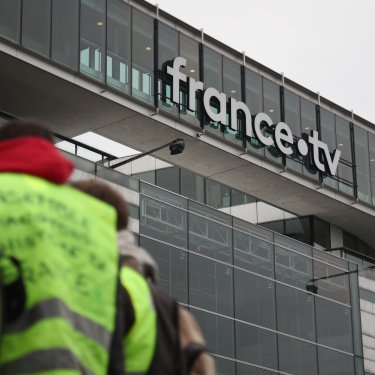More anti-media hostility and violence at France’s “Gilets Jaunes” protests

As the members of France’s “Gilets Jaunes” (Yellow Vest) protest movement discuss how or whether they will continue their anti-government protests in 2019, Reporters Without Borders (RSF) calls for an end to the violence against journalists by both demonstrators and police that has accompanied these protests ever since they began in mid-November.
Not only did the seventh major Yellow Vest protest of 2018, on 29 December, called “Act VII,” see more of this violence, but several hundred demonstrators also gathered outside the headquarters of France Télévisions and the 24-hour TV news channel BFMTV in Paris, chanting such slogans as “BFM fake news” and “Collaborator journalists!”
Several reporters and photographers were the targets of verbal and physical violence while covering the protests in various parts of the country on 29 December. Others had their equipment seized.
Simon Louvet, a reporter for the regional news website 76actu, was attacked by police while filming a heavy-handed arrest in Rouen. He reported on Twitter that a policeman “aimed his flashball gun at me” and that a policewoman “struck my left hand with her baton.” Publihebdos, the media group to which 76actu belongs, issued a statement condemning this “unacceptable act of police violence.”
Thibaud Moritz, a photographer for the newspaper Libération, reported that a policeman fired a flashball at him while he was covering a protest in Bordeaux. Jérémie Lusseau, a photographer with the Hans Lucas Studio, said he was directly threatened by police while covering a violent arrest. “You’ll be next, I’ll smash your mouth and your camera,” one of the policemen reportedly told him.
At a traffic circle in Normandy earlier in the week, two young journalists were prevented from filming by police, who seized their equipment. When they went to a nearby police station to recover the equipment, they witnessed a heavy-handed arrest which they began filming until forced to delete their footage.They then decided to go to a different police station to file a complaint against these police officers. The first police station they went to refused to register the complaint, but the second did.
“We condemn these latest verbal and physical attacks against journalists, by both demonstrators and police,” RSF said. “Journalists are caught between the violence of some Yellow Vest protesters and police violence, although they are just doing their job to report the news. If these protests continue, journalists must be able to continue covering them without fearing for their safety.”
In some cases, reporters were prevented from continuing to cover a protest by the protesters themselves. This is happened to journalists from CNEWS and France Bleu Gironde, who were forcibly expelled from a Yellow Vest demonstration in Bordeaux by some of the protesters.
Unhappy with the way some media outlets have covered the protests, around 20 protesters blocked the entrance to the Sipa Ouest-France media group’s printing press near Nantes on 26 December. By blocking the departure of newspaper delivery trucks, they prevented the distribution of more than 180,000 copies of the Ouest-France, Presse Océan and Courrier de l’Ouest newspapers. The media group deplored “this unprecedented action that poses a serious threat to press freedom and democracy.”
Threats on social networks have also grown. Since misreporting the extent of destruction by protesters during a live report from the Champs-Elysées in Paris in November, for which he later apologized, BFMTV reporter Barthélémy Bolo has been the target of an online harassment campaign and has been receiving insults and death threats. He has filed a complaint about the threats.
France is ranked 33rd out of 180 countries in RSF’s 2018 World Press Freedom Index.



